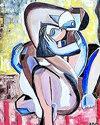魔术中球员习惯的智能性和反射性:聚首竞技场有限选秀
IF 0.3
4区 社会学
0 HUMANITIES, MULTIDISCIPLINARY
ANGELAKI-JOURNAL OF THE THEORETICAL HUMANITIES
Pub Date : 2023-05-04
DOI:10.1080/0969725X.2023.2216545
引用次数: 0
摘要
摘要本文研究了《魔法:聚会》(MTG)有限选秀的玩家如何将他们获得的游戏风格或性格(MTG“玩家习惯”)转化为知识对象。这样做是为了有意识地对其进行返工,以应对新的格式和不断变化的元游戏。我将重点关注一个特定的案例研究:流媒体Chord_O_Calls的教学视频如何显示他自己对某些卡片的重新评估。显然,这是一个需要自反性的过程,尽管我的目标是具体说明所涉及的特定“自反性形式”。我将其向外分发到MTG“习惯集合”(一个技术、事物、关系的集合),并认为任何个体玩家对这种自反性的实例化都涉及对MTG习惯集合中的副文本的基于实践的合成,该副文本不是编码的,而是由集合塑造的。这导致人们不仅要考虑特定习惯的“智力”和局限性,还要考虑MTG“习惯组合”本身的“智力和局限性”。我认为,这里激增的自反性形式的更广泛的社会技术意义是由其灵活性、延迟和转移分类的注意力风格所定义的。本文章由计算机程序翻译,如有差异,请以英文原文为准。
The Intelligence of Player Habits and Reflexivity in Magic: The Gathering Arena Limited Draft
Abstract This paper considers how players of Magic: The Gathering (MTG) limited draft turn their acquired gameplay style or disposition (their MTG “gamer habitus”), with respect to drafting, into an object of knowledge. This is done in order to then consciously rework it, to respond to new formats and to the changing metagame. I will focus on a particular case study: how streamer Chord_O_Calls' instructional video shows his own re-evaluation of certain cards. Evidently, it is a process requiring reflexivity, although I aim to be specific with regard to the particular “form of reflexivity” involved. I distribute this outward to the MTG “habit assemblage” (an ensemble of techniques, things, relations) and argue that any individual player's instantiation of this reflexivity involves a practice-based synthesis of paratexts from the MTG habit assemblage that is not codified but is shaped by the assemblage. This leads to a consideration of the “intelligence” and limits of not only particular habits but that of the MTG “habit assemblage” itself. I argue that the broader socio-technical significance of the form of reflexivity that is being proliferated here is one which is defined by its flexibility, by an attentional style of delayed and shifting categorization.
求助全文
通过发布文献求助,成功后即可免费获取论文全文。
去求助
来源期刊

ANGELAKI-JOURNAL OF THE THEORETICAL HUMANITIES
HUMANITIES, MULTIDISCIPLINARY-
CiteScore
0.60
自引率
33.30%
发文量
57
期刊介绍:
Angelaki: journal of the theoretical humanities was established in September 1993 to provide an international forum for vanguard work in the theoretical humanities. In itself a contentious category, "theoretical humanities" represents the productive nexus of work in the disciplinary fields of literary criticism and theory, philosophy, and cultural studies. The journal is dedicated to the refreshing of intellectual coordinates, and to the challenging and vivifying process of re-thinking. Angelaki: journal of the theoretical humanities encourages a critical engagement with theory in terms of disciplinary development and intellectual and political usefulness, the inquiry into and articulation of culture.
 求助内容:
求助内容: 应助结果提醒方式:
应助结果提醒方式:


